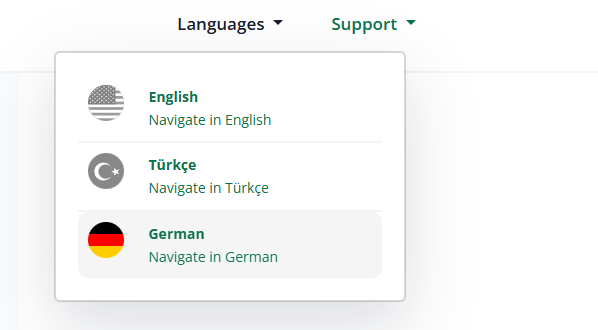I18n
Olodoc supports English, Turkish and German languages by default. If you want Olodoc to support more languages, you can contribute by adding the languages you know to Olodoc from our github repo address.
- To add a new translation, translate the olodoc.php file from below and send it to us.
//github.com/olomadev/olodoc-skeleton/blob/main/data/language/en/olodoc.php
i18n Files
In your application, only 1 file named default.php needs to be translated to your languages. The other one is the core translation file olodoc.php. If your languages are not in the language directory, it needs to be copied and translated.
data/language/en/default.php(your app translations)data/language/en/olodoc.php(olodoc translations)
- myproject
+ bin
+ config
- data
- language
- en
default.php
olodoc.php
- tr
default.php
olodoc.phpNavigation
To add language support to your navigation index file, all you need to do is use the $translator->translate() object method as in the example below for your existing tags in this file.
The translate object here is the
Laminas\I18n\Translator\Translatorclass that was included in your application with theOlodoc/LaminasDocumentManagerFactory.
<?php
/**
* Navigation index
*/
return [
[
'label' => $translator->translate('Introduction'),
'url' => '/index.html',
'meta' => [
'title' => $translator->translate('Introduction'),
'keywords' => $translator->translate('intro, introduction, open source, document, generation, php'),
'description' => $translator->translate('Olodoc is an open source documentation creation tool developed in PHP to create documentation from your foldered markdown files. It allows you to create and customize unique templates for your applications with the Bootstrap 5 CSS framework'),
]
],
[
'label' => $translator->translate('Installation'),
'url' => '/installation.html',
],
];
Running
If you are setting up a multilingual project via a subdomain, add the languages you plan to support as follows.
127.0.1.1 example.local
127.0.1.1 en.example.local
127.0.1.1 tr.example.localNow you can visit yout application with your new language.
http://tr.example.localAdding a New Language
For example to add German (de) language we need to follow below the steps.
- Add new language key and label to your olodoc config.
return [
//
// olodoc
//
'olodoc' => [
/** .... */
'default_locale' => 'en',
'available_locales' => [
'en' => 'English',
'tr' => 'Türkçe',
'de' => 'German',
],
];
];
?>- Go to this flag Icons repo then copy and paste your new svg flag to your olodoc config like below.
return [
//
// olodoc
//
'olodoc' => [
/** .... */
'anchors_for_index_pages' => true, // if false anchors will not be created in index.html routes
//
// More flags is here: https://github.com/lipis/flag-icons/tree/main/flags/1x1
//
'flags' => [
'en' => '<svg xmlns="http://www.w3.org/2000/svg" class="grayscale" width="24" height="24" id="flag-icons-en" style="border-radius: 50%;" viewBox="0 0 512 512"><path fill="#bd3d44" d="M0 0h512v512H0"/><path stroke="#fff" stroke-width="40" d="M0 58h512M0 137h512M0 216h512M0 295h512M0 374h512M0 453h512"/><path fill="#192f5d" d="M0 0h390v275H0z"/><marker id="us-a" markerHeight="30" markerWidth="30"><path fill="#fff" d="m15 0 9.3 28.6L0 11h30L5.7 28.6"/></marker><path fill="none" marker-mid="url(#us-a)" d="m0 0 18 11h65 65 65 65 66L51 39h65 65 65 65L18 66h65 65 65 65 66L51 94h65 65 65 65L18 121h65 65 65 65 66L51 149h65 65 65 65L18 177h65 65 65 65 66L51 205h65 65 65 65L18 232h65 65 65 65 66z"/></svg>',
'tr' => '<svg xmlns="http://www.w3.org/2000/svg" class="grayscale" width="24" height="24" id="flag-icons-tr" style="border-radius: 50%;" viewBox="0 0 512 512"><g fill-rule="evenodd"><path fill="#e30a17" d="M0 0h512v512H0z"/><path fill="#fff" d="M348.8 264c0 70.6-58.3 127.9-130.1 127.9s-130.1-57.3-130.1-128 58.2-127.8 130-127.8S348.9 193.3 348.9 264z"/><path fill="#e30a17" d="M355.3 264c0 56.5-46.6 102.3-104.1 102.3s-104-45.8-104-102.3 46.5-102.3 104-102.3 104 45.8 104 102.3z"/><path fill="#fff" d="m374.1 204.2-1 47.3-44.2 12 43.5 15.5-1 43.3 28.3-33.8 42.9 14.8-24.8-36.3 30.2-36.1-46.4 12.8z"/></g></svg>',
'de' => '<svg xmlns="http://www.w3.org/2000/svg" class="grayscale" id="flag-icons-de" viewBox="0 0 512 512"><path fill="#fc0" d="M0 341.3h512V512H0z"/><path fill="#000001" d="M0 0h512v170.7H0z"/><path fill="red" d="M0 170.7h512v170.6H0z"/></svg>',
],
],
];- Add grayscale ol-flag class attribute to your svg.
'flags' => [
'de' => '<svg xmlns="http://www.w3.org/2000/svg"
class="grayscale ol-flag" id="flag-icons-de" viewBox="0 0 512 512">
<path fill="#fc0" d="M0 341.3h512V512H0z"/>
<path fill="#000001" d="M0 0h512v170.7H0z"/>
<path fill="red" d="M0 170.7h512v170.6H0z"/>
</svg>'
];- Create a new language folder and copy the translations.
Copy default.php and olodoc.php language files then translate them into to German language.
- myproject
+ bin
+ config
- data
- language
- en
default.php
olodoc.php
+ tr
- de
default.php
olodoc.php- Create a folder for your Markdown files and create documents in German language in this folder.
- myproject
+ bin
+ config
- data
- docs
- 1.0
- en
index.md
installation.md
+ tr
- de
index.md
installation.md- Add German translation key to your host file.
127.0.1.1 example.local
127.0.1.1 en.example.local
127.0.1.1 tr.example.local
127.0.1.1 de.example.localand make sure you have a alias configuration in your apache vhost file like below.
<VirtualHost *:80>
SetEnv "APP_ENV" "local"
ServerName example.local
ServerAlias *.example.local # subdomain support
ServerAdmin webmaster@localhost
DocumentRoot /var/www/myproject/public/
DirectoryIndex index.php
ErrorLog ${APACHE_LOG_DIR}/error.log
CustomLog ${APACHE_LOG_DIR}/access.log combined
</VirtualHost>Now you can generate your new german documents using command line to html files.
composer olodoc:generateVisit the en.example.local adress from your browser if everyting went well you will see your new language in your navigation bar like below.
